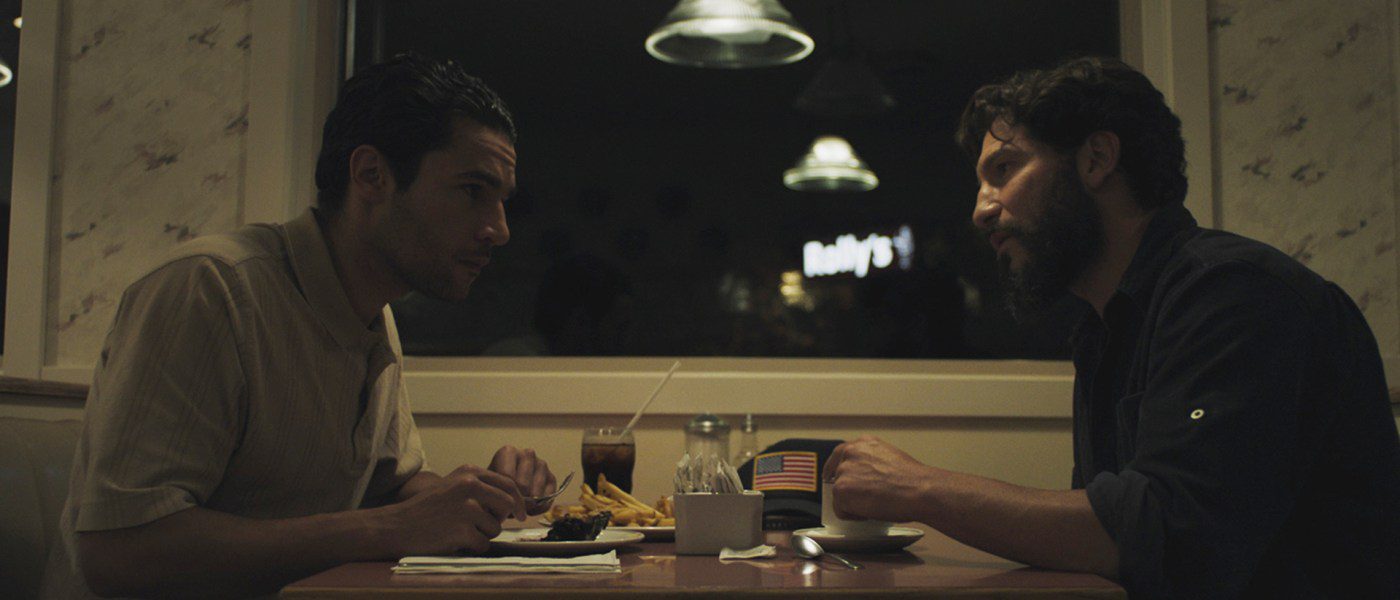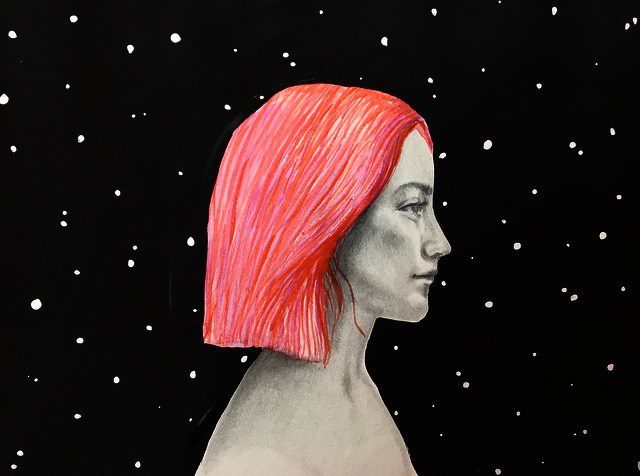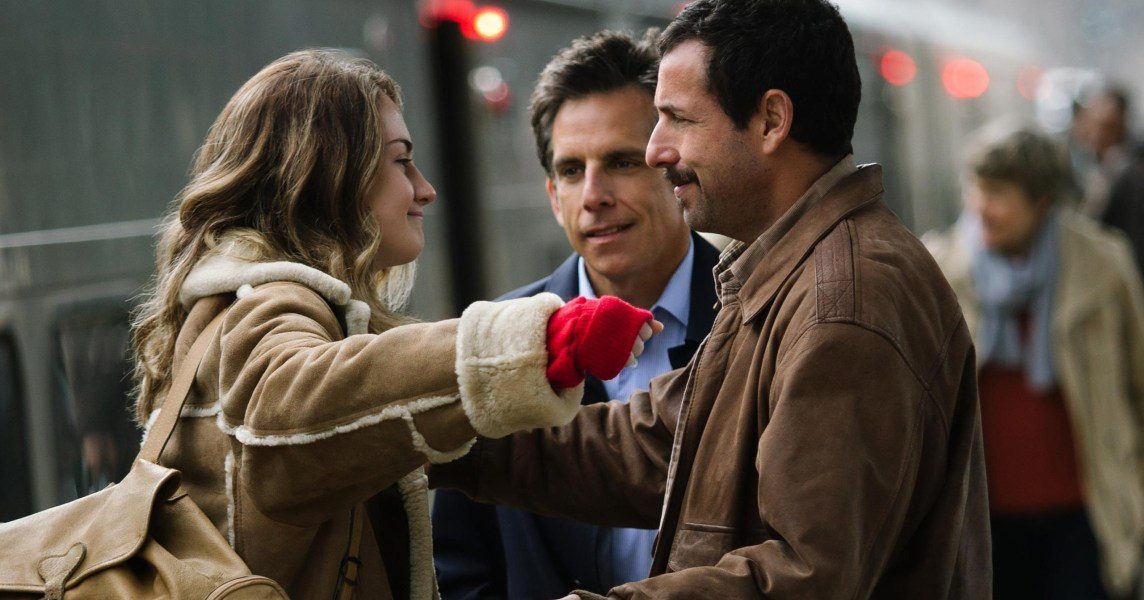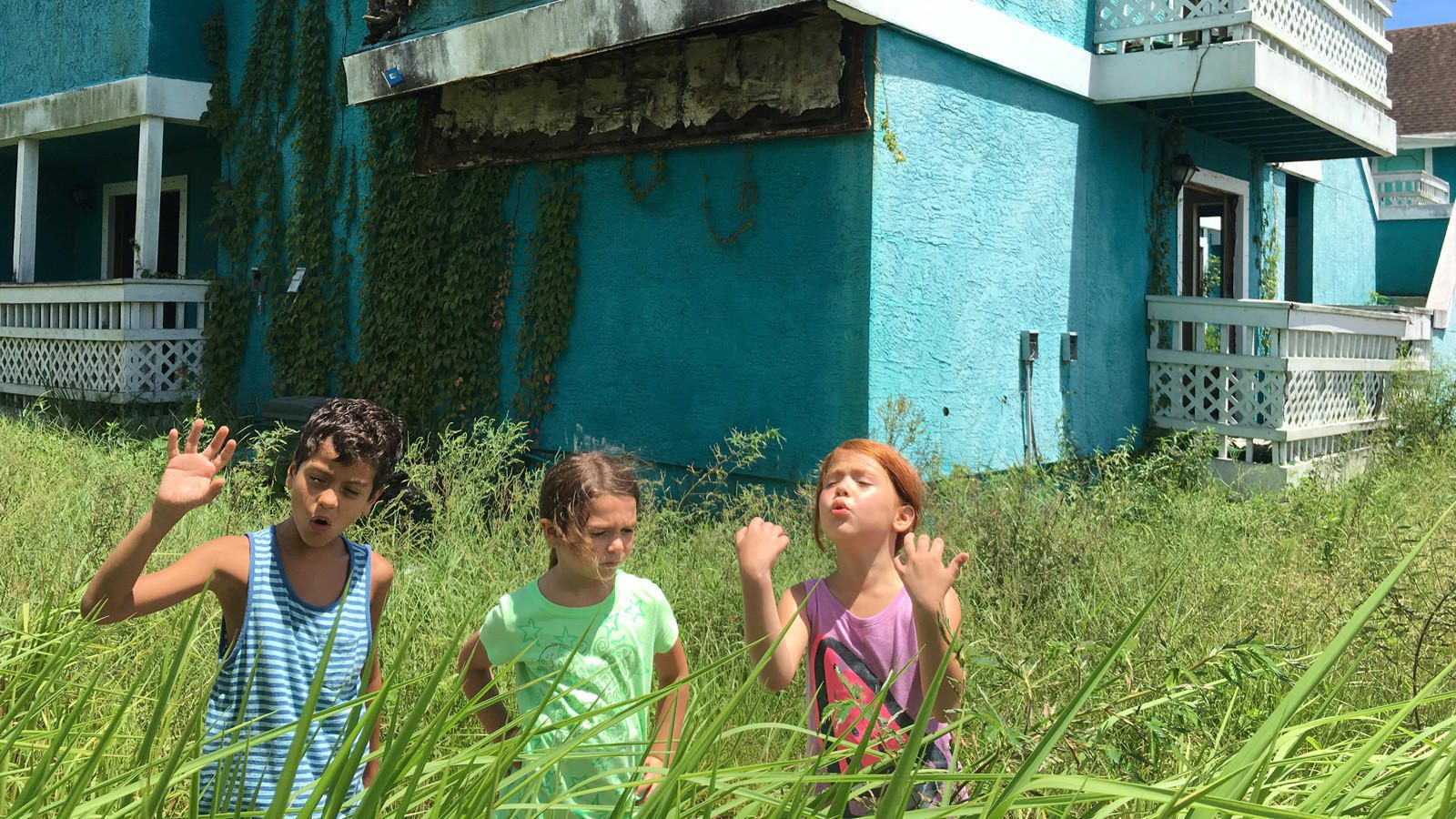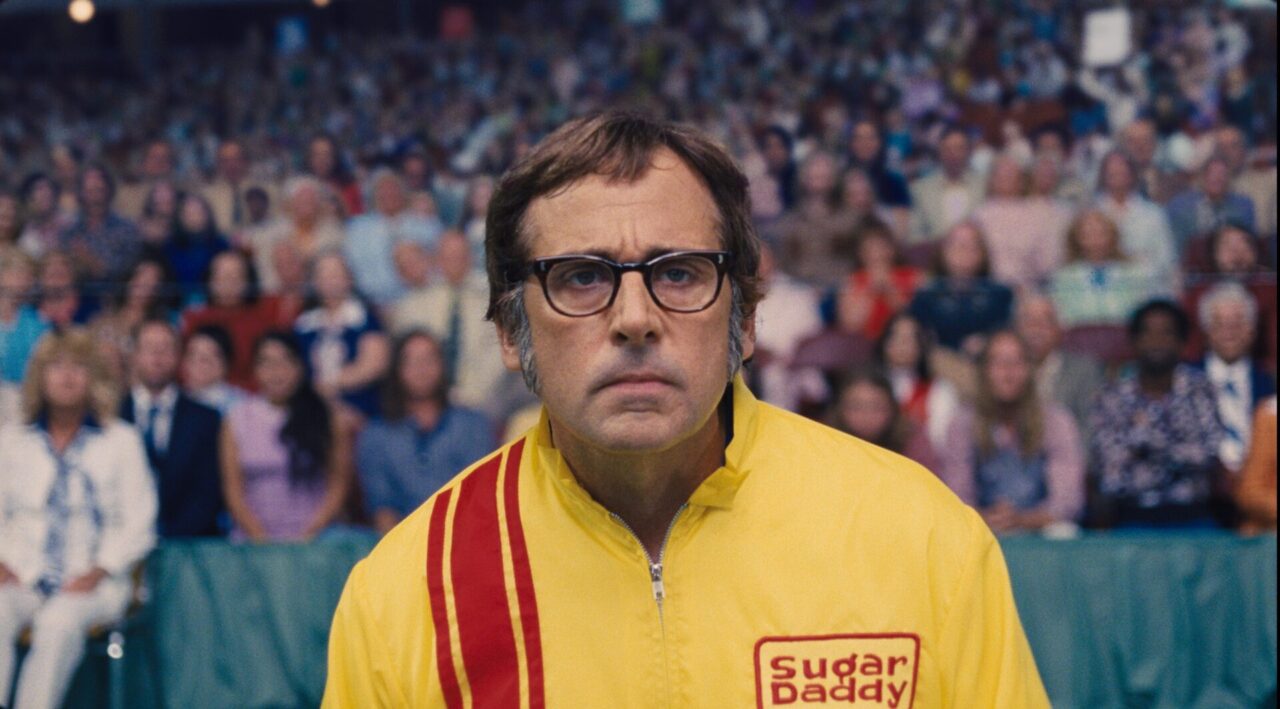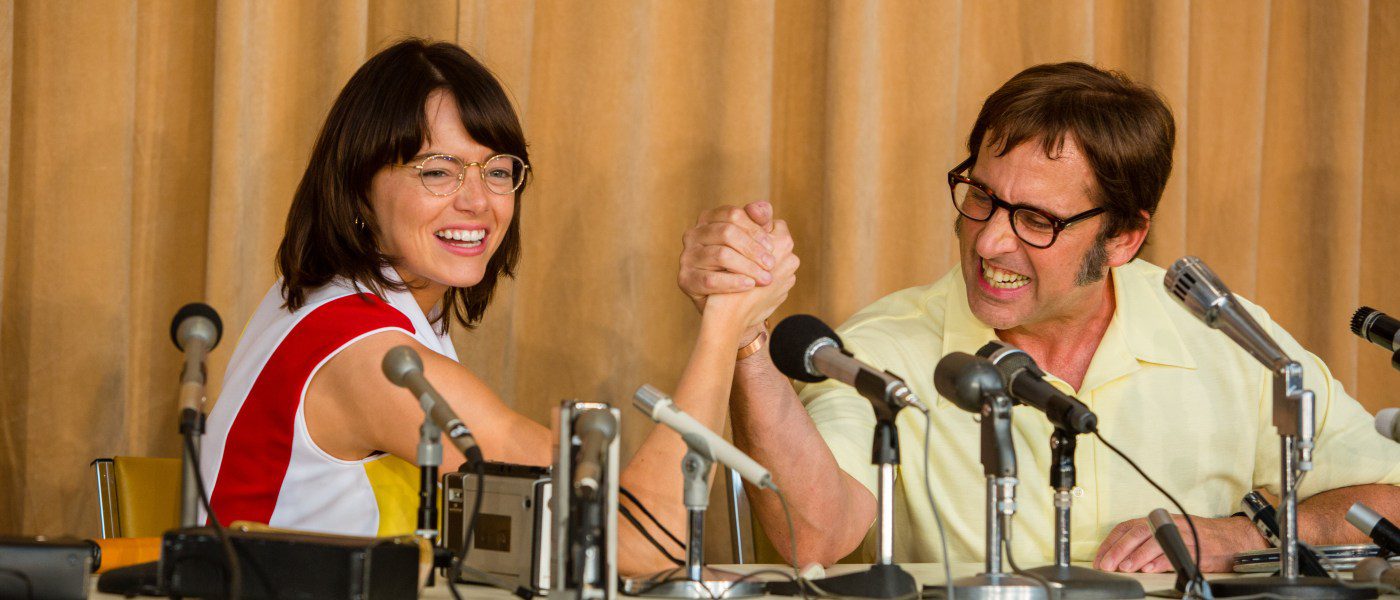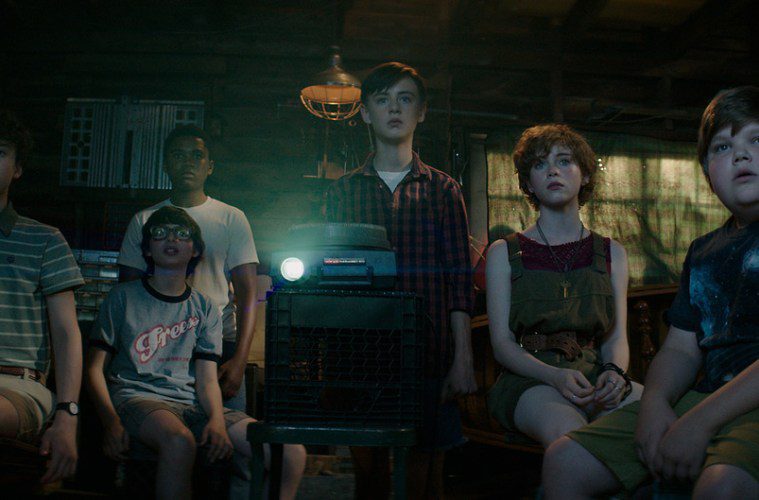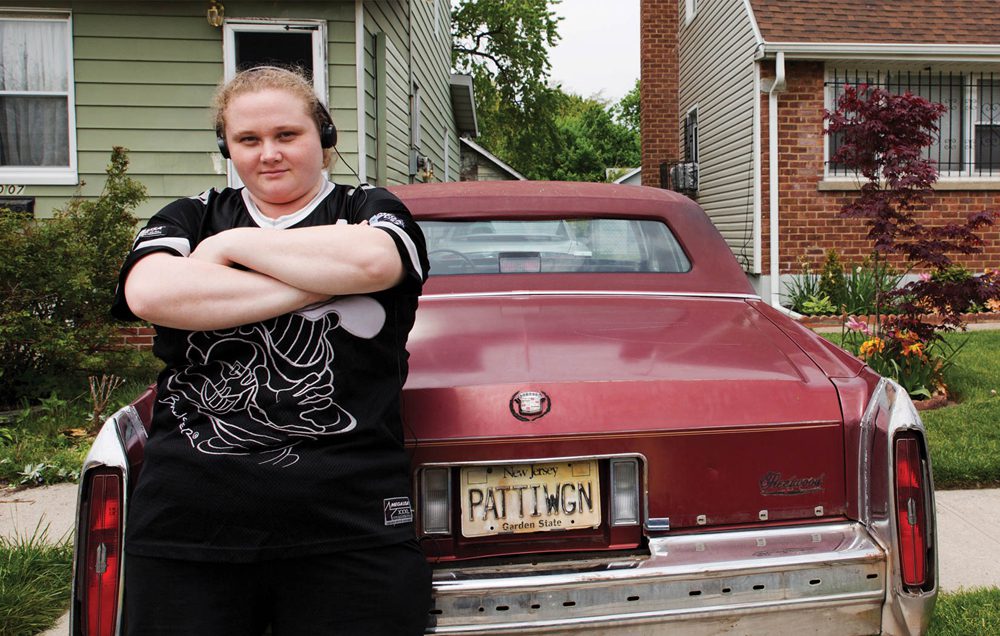'Sweet Virginia' Review: Powerful Performances Ground this Pulpy Thriller
Sweet Virginia isn't so much sweet as it is deadly serious as the film's two lead actors – a gritty Christopher Abbott and Jon Bernthal – fully tap into. Which is what makes the whole thing so damn fun.
These macho men get to play two troubled dudes whose lives intertwine when a murder leaves a messy trail behind. Bernthal stars as Sam, a former rodeo champion who controls his shaking hand and normal life while dating Bernadette (Rosemarie Dewitt) and managing a motel. His life changes when he rents a room to Elwood (Abbott), a young man whose violent introduction in the film's opening scene leaves us wondering what sort of danger he won't put himself in. The film is a moody piece of pulp thriller action and fun to squirm in your seat through. Audiences seeking out this dark and gritty filmmaking will likely get their fix of tense action.
It's a subdued slugfest between Bernthal, who will soon come to be best recognized in his starring role as the Marvel Comics vigilante in Netflix's "The Punisher" and Abbott, best known as the actor who walked away from the hit HBO series "Girls" to pursue more dramatic art-fare like James White, which showed his Brando-reaching ambitions. When these two share the screen, which is the film's biggest draw and likely the best part, it feels both intense, like panthers circling each other waiting for the other's guard to slip so they can attack, and also a bit wooden, as if their performances keep bumping into each others'. What might better distinguish their relationship is if Bernthal as Sam played up his former stuntman struggling to live a normal life to counter Abbot's Elwood, who could have also turned the dial up a bit to play a more unpredictable live-wire character.
Come for the pulpy thriller that you know you're going to get, stay for the unexpected pairing of powerhouse performances.
Written by Benjamin and Paul China, the film is tight but there's not a lot inherently happening that makes it deep besides these actors tussling it up a bit. The last bit of life force not drained by Abbott and Bernthal goes to the combined efforts of Rosemarie Dewitt and Imogen Poots, who both shine in these dark worlds. You won't see them holster any guns or command any scenes, as their passive characters both defer to Sam and Elwood respectively.
In only his second feature film, Jamie M. Dagg gets the tone down right – it feels so dense and full of tension with what little he's really doing here. Dagg proves he knows how to utilize production restraints to what is an essential element of the genre with, more often than not, a micro-budget. This includes a nondescript location in the middle of nowhere, a handful of characters (seriously, where is everyone else in this town?), and a whole lot of silence. But these elements are handled so well that it makes watching from start to finish a fine time. In Sweet Virginia, come for the pulpy thriller that you know you're going to get, but stay for the unexpected pairing of powerhouse performances.
93 min. 'Sweet Virginia' is rated R for violence, some strong sexuality, language, and drug use. In theaters today.
https://www.youtube.com/watch?v=Jz3E_CCaAXo
Greta Gerwig's 'Lady Bird' Will Easily Win Your Heart
There's a word that describes the infectiously lovable Lady Bird, and it's one that best characterizes the film's writer and director as well: original. Delightfully, achingly original.
Having won over art-house audiences after starring as Noah Baumbach's flighty blonde muse in films Frances Ha and Mistress America, indie darling Greta Gerwig asserts herself as an equally gifted storyteller with her loose but confident directorial debut, Lady Bird. Gerwig manages to do more than just tell the story of a spunky and spirited high school youth entering young adulthood in small-town Sacramento. She also validates the "Dilemma of the Young Person" as more than just a teenage angst-filled journey, but a constant striving for identity and the self-inflicted struggle of one's calling to be original, or, to be "an original."
I'll just go ahead and say it now – Lady Bird is one of the most spirited and enjoyable films of the year, and you would be doing yourself a favor to see it at your soonest opportunity.
Lady Bird is a laugh a minute – sometimes even quicker – as we follow our punky protagonist, high school senior Christine McPherson (Saoirse Ronan). Her restless nature colors the whims of her world as much as her dyed red-streaked hair colors her quirky appearance (the film takes place in 2002, so the look and fashions are one step delayed). The film weaves through all of the moments of Lady Bird's life – auditioning for the school musical, the butterflies of a budding relationship and becoming intimate with a boy (Lucas Hedges), and applying to liberal arts schools on the east coast. The latter is an essential escape Lady Bird feels she needs to break out of her confining and lifeless environment. All this is experienced with her best friend (Beanie Feldstein) and under the critical eye of her mother (Laurie Metcalf) who, when not criticizing each of her quirks, reminds her of the family's financial constraints and its effect on her dreams.
If directorial debuts are the best revelation of the true spirit of the filmmaker, then it should come as no surprise that Greta Gerwig's first feature film soars.
Saoirse Ronan, who swaps her native Irish accent for a NorCal attitude, is ferociously fun as Lady Bird, a sort of female equivalent of Max Fischer from Rushmore. They don't set out to necessarily upset the establishment, but do so out of necessity to their natures. Like Fischer, precociously punky and unapologetically flawed, Lady Bird's shortcomings stem from trouble with friends and family and her unwillingness to blend into the background.
Lady Bird is infectiously funny and so pure-spirited that it will leave you emotionally complete. The laughs ring true, and so do the heartache and despondency. If directorial debuts are the best revelation of the true spirit of the filmmaker, then it should come as no surprise that Greta Gerwig's first feature film soars.
'Lady Bird' is rated R for language, sexual content, brief graphic nudity and teen partying. 93 minutes. Now playing at AMC Century City, The Landmark, and ArcLight Theaters.
https://www.youtube.com/watch?v=cNi_HC839Wo
'The Meyerowitz Stories (New and Selected)' Review: Adam Sandler Shines in Baumbach's Latest
Noah Baumbach has lept from the artsy French New Wave Frances Ha to the comedy Mistress America to a fully indulgent comedy/drama in The Meyerowitz Stories (New and Selected).
In the typical Baumbach movie, it's clear that he admires the liberal arts socialite life as much as he likes to poke at with its nose in the air. The Meyerowitz Stories (New and Selected) is a familial drama centered around three adult children and their father who come together in New York for an event that celebrates his artistic work.
Dustin Hoffman is fantastic as Harold Meyerowitz, the stubborn bygone man of self-given importance who would never let the rest of the world see him as struggling. Ben Stiller, returning to another Baumbach production after last seeing him as anxiety-laden Roger Greenberg in Greenberg, plays Matthew, Harold's thriving businessman son who isn't bogged down by his father's troubles. Elizabeth Marvel plays Jean, the mousey and reserved yet artistically inclined sister.
Taking the lead amongst the players is Adam Sandler as Danny, who is always a delight to see in a more seriously-taken role. His failed marriage aside, he also struggles with a chronically worsening condition that he ignores. Sandler's character construction is one of an unfulfilled middle-ager, un-pretension, and on the verge of rage.
...Baumbach commits to the joke that the more intelligent the family, the more they wrap themselves up in their own minutia and make even greater dysfunction.
The Meyerowitz Stories is chaptered with shared scenes showing the personal relationships of each son and father. It feels like the kind of movie that would take place if the kids from The Squid and the Whale grew up and sprouted their own dysfunctional families, and could also be a cousin to Wes Anderson's The Royal Tenenbaums (which perhaps Baumbach has made his version of children grown under the roof of bohemian socialites who, now adult, struggle to connect with their parents and themselves). The dialogue feels stageplay screwball, like a Woody Allen film, with cyclical jokes drawing attention to the farce. Finally, player piano accompaniment from Randy Newman keeps the whole thing whimsical.
Baumbach's film is smart, funny, tender and affecting. If it doesn't tire you out that, again, Baumbach commits to the joke that the more intelligent the family, the more they wrap themselves up in their own minutia and make even greater dysfunction. The film should play cozy for those who will be watching from the comfort of their couches, which is now available to stream on Netflix.
The Meyerowitz Stories (New and Selected) is a film that's equally high and low art, which Baumbach seems to knead and bend in play-dough fashion, perhaps secretly grappling with a sense of art that imbues importance without being too self-important.
'The Meyerowitz Stories (New and Selected)' is rated TV-MA. 112 minutes. Now streaming on Netflix.
'The Florida Project': Treat Yourself To This Moving, Magical Testament To Childhood
In 2014, Boyhood stunned audiences by showing a boy growing up and coming of age over a 12-year span.
The film's depiction of childhood captured these universally familiar moments so simply, so beautifully. The naturalness of such well-chosen non-actors conjured up a sense of cinema verité magic in a way that most movies cannot. Another indie film that re-captures this sense of magic is this year's The Florida Project, in theaters this Friday. Writer/director Sean Baker, whose previous film Tangerine (which was shot on an iPhone), tells the story of childhood and the theme of limitless boundaries that either dance around reality or run straight into it.
Quite simply, The Florida Project is a story about kids being kids. Taking place at an extended stay motel where folks and families of all types live while they scrape together next month's rent, the kids scurry through the stairs and parking lot with a sense of boundless energy that leaps off the screen and into audiences' hearts. We follow one precocious six-year-old girl, Moonee (Brooklynn Prince), and friends over one mostly-unsupervised summer. They run, play, and cause mischief throughout a string of motels (called the Magic Castle motel and Wonderland Inn) where they live with their financially-strapped single mothers. Their general safety is overseen by the motel's manager Bobby (Willem Dafoe), who, despite needing to clean the grounds and the bed bugs, keeps an eye on the group of little ankle biters before they zoom off.
To execute a film like this, putting your trust in one largely unproven young star for the audience to follow, would seem like an impossible task – and yet it's not for Baker, whose casting of Brooklynn Prince makes the film soar. Prince as Moonee is a petite package of rambunctiousness and non-stop energy (which I can attest is her real-life self, seeing her run aimlessly while playing "Marco Polo" at an after party for the film). But although she's sugar-hopped and manners-deprived, it's not Moonee's fault. She is being raised by Halley (Bria Vinaite), a single mother who could easily pass as her older sister.
'The Florida Project,' a beautifully photographed film with such natural performance, is a gentle reminder that while wonderland might be a myth, it's the wonder of childhood that makes living magical.
Halley is pierced, tattooed, and stoned, and encourages her child's untethered ways– for who is she but a grown up child herself? Moonee is always brimming with life and charisma, which makes her interactions with Bobby heartwarming ones. This beautiful guardian from afar relationship is brought to life by Willem Dafoe, whose often manic-obsessed performance is dialed all the way down, and he shines in such a humanist light that it must be remembered come Awards season. Dafoe also navigates working with the non-actors beautifully, lending the soft and patient heart that sees him stand as paternal to young Moonee when things go south for her parent.
Director Sean Baker stages these otherwise ordinary moments to give the whole thing fantastic and cinematic flair. We get sucked into the point of view of these kids, where pinks and purples artfully illustrate a depressed artificiality, a run-down fantasy that can't help but draw attention to itself as the decaying American dream.
Baker, whose previous film Tangerine so eloquently captured and celebrated the fringe society that lives outside the middle-class, does so again here on an even grander scale. The Florida Project even more artfully compels audiences to recognize what Baker is showing as the most glaring hardship of all: the tragic conflict of expectation versus reality in this American life. These motels, so seedy under the weight of once-wonderful facade, live on the outskirts of Disney World itself – road signs, disheartened tourists, and knock-off merchandise further illustrate how they all live in this B-dream of a country.
These snapshots of scenes, stitched together to show the life of these characters day-in and day-out, all culminate and crash down in the film's tear-jerking final sequence that reminds us that the dream ends, and in the eyes of a child that is nothing short of heartbreaking. The Florida Project, a beautifully photographed film with such natural performances, is a gentle reminder that while wonderland might be a myth, it's the wonder of childhood that makes living magical.
115 minutes. 'The Florida Project' is rated R for language throughout, disturbing behavior, sexual references and some drug material.
Steve Carell's feminist role model: his late mother, a psychiatric nurse
Former female tennis champion Billie Jean King is one of the most influential athletes to ever live.
Her story is the subject of the new film "Battle of the Sexes," starring Emma Stone as King and Steve Carell as Bobby Riggs, the man who challenged her to a gender-competing tennis match on nationally broadcast television. King's skillful ability to play the game, in addition to her being a female athlete, helped reshape social feminist conventions.
Attending a press conference for the film, I was lucky enough to ask select cast members and the filmmakers who their most influential female heroes and mentors were. Read their answers below before seeing "Battle of the Sexes" this Friday to see whose influences helped inspire not only their performances and artistry but their perspective and outlook on life.
Steve Carell (Bobby Riggs): His Mother
It was my mom [Harriet Carell]. I got asked a question yesterday, 'During this period of time, when you were eleven, did the [King vs Riggs] match affect you in terms of your ideas of feminism and chauvinism?' I said I wasn't really aware of it because of my mom and her relationship with my dad. There was such equity in their relationship. They were equal breadwinners and equal child raisers. She was a psychiatric nurse so definitely, my mom was the template of empowerment for me.

Elisabeth Shue (Priscilla Wheelan): Her Daughter, Billie Jean King
I have two. The first person who popped into my mind was my 11-year-old daughter, Agnes. She's so loving towards everyone and very open and very comfortable in her own skin. And to be honest, after going through this experience on this movie, Billie Jean King has become a really important role model for me because I don't like pressure. I get very anxious. Even just being here makes me have anxiety! But getting to know her and her openness and lovely generosity towards everybody, always wanting to build everybody up and not really worried about herself. I play tennis, and hopefully one day I'm going to be on a tennis court where there's going to be tense pressure and I'm going to be calm and relaxed.

Valerie Faris (Co-Director): Her Teacher
I had a teacher at UCLA, Shirley Clarke, who was an experimental documentary filmmaker, and she was a total inspiration. There are a lot of [mentors], but she was a good one.
Jonathan Dayton (Co-Director): His Mother
I would have to say, my mother. She was a school teacher, a brilliant person, and she was lucky to have a career but I know at a different time she could have done even more with her life. She was a great mother as well.

Sara Bareilles (Original Song): Billie Jean King, writing partner Jessie Nelson
I have a few as well. Billie Jean King [for one], especially after getting to meet her. That has been such a profound experience. Someone who's closer in my life is my writing partner Jessie Nelson, who I met writing a musical called "Waitress." She's really changed my perspective on what it means to be a woman in business and how to hold each other up and how to root for and enlighten each other along the way. She's been a great role model and kind of my hero these days.
Eric Christian Olsen (Lornie Kuhle): His Mom
That's easy. My mom. She's a non-denominational Chaplin which means you don't have a specific religion you use for healing. It's funny because my dad is a professor and he was always the smartest guy in the room until my mom walked into the room, and then she was the smartest person in the room. Watching this movie and as you do research, realizing what she grew up in, and how she turned out to be this incredibly articulate, powerful, loving, and empathetic creature just doubles down on how amazing and inspiring she is.

Nicholas Britell (Orchestrator): His First Piano Teacher
My first piano teacher inspired me a lot. I remember in my first music classes, she would just be playing the piano for the room and I thought that would be pretty cool to [learn how] to do.
Bill Pullman (Jack Kramer): An Artful Bohemian
I think of Gennie DeWeese, an artist from Montana. When I was young, in my twenties, I went to Montana to live there and do theatre for awhile before I got into the business. She was a true bohemian who really lived an artful life. Everything from how she perceived the day was a sort of mirror that I looked into and realized that there was quite a bit of fraud in my bohemian life. Partying, and what not. She really taught me a lot about what it is to be an artist.

'Battle of the Sexes' Review: This Famous Tennis Match is a Timely Message on Misogyny
In 1973, 29-year-old Women's tennis champion Billie Jean King was publicly challenged to a match by former Men’s tennis champion and ego-centric chauvinist, 55-year-old Bobby Riggs.
What was on the line for this playful yet all-but patronizing match differed for each athlete. For the self-obsessed showman, Riggs looked to reaffirm not only his own greatness but the unequivocal superiority of male athletes over female athletes.
For King, however, the outcome of this match was anything but light-hearted– she was fighting on behalf of women everywhere to gain the respect from male counterparts not only in the sport of tennis but in daily life. The famous match, which was broadcast around the world by ABC and to this day remains one of the highest-watched sports events of all time, is the subject of Battle of the Sexes, directed by the filmmakers of Little Miss Sunshine and starring Emma Stone as the steely-focused King and Steve Carell as the piggish Riggs.
Not-so-side note: if this premise of a misogynistic media-ham belittling women in the public eye for his own gains sounds strangely familiar to the headlines that dominated the American news-cycle during last year's presidential election, you wouldn't be wrong. That makes this tennis drama as timely as it is a necessary a reflection of how far we've come and how far we still have to go in securing equal rights for all.
Battle of the Sexes uses the tennis match as a vehicle to tell a much larger story that centers around King and her struggle for acceptance and equality in the sport. Stone is more than ready and game to slip into King’s court shoes, exuding a strong inner confidence in the film’s opening. Here, King, the reigning champion of the official Women's league, is met with the flippant sexism of being told the Women's prize will be a smaller purse than the Men’s from league President Jack Kramer (Bill Pullman). Not thinking twice, she drops out to form her own tournament, with hurt but unshaken confidence carrying her onward. The film goes deeper into King’s backstory when it’s revealed that she is doing this as a closeted yet married woman at a time when LGBTQ rights were significantly less than they are today.
Like a tennis player who knows when to soften a backhand lob or directly nail a line hit, Emma Stone as Billie Jean King is exacts her emotions with precision, pitting between moments of triumph and defeats in self-acceptance.
Coming off of last year’s Best Actress Oscar win for La La Land, Emma Stone as Billie Jean King is effortlessly good, covering all spots on the emotional court that this character demands. She plays the stone-faced and determined competitor as much as the insecure reluctant hero and everything in between. Like a tennis player who knows when to soften a backhand lob or directly nail a line hit, Emma Stone as Billie Jean King is exacts her emotions with precision, pitting between moments of triumph and defeats in self-acceptance.
Battle of the Sexes alternates with Riggs’ B-story, as he comes to terms with being once a winner but now a debilitated gambler with trust issues. The filmmakers develop Riggs into a man suffering from his own insecurities and Steve Carell’s trademark “lovable-in-spite-of-himself” character work makes Riggs not your stereotypical “villain.”
The performances and story arc make Battle of the Sexes a universally appealing film but it’s the lush and beautiful cinematography, compositions, and mood-building that directors Valerie Faris and Jonathan Dayton have created that make this an aesthetically strong and greatly packaged one. But what else would you expect from the filmmakers of Little Miss Sunshine who won audiences over in that Sundance classic? The message behind Sexes, like Sunshine, strives to strip away facade and inaccuracy in order to expose the human condition and a love of people for who they really are.
https://www.youtube.com/watch?v=o5ykcuAS1F4
"Battle of the Sexes" is rated PG-13 for some sexual content and partial nudity. 121 minutes. In select theaters Friday.
'It' Review: Borrowing Nostalgia to Induce Nightmares
In theaters now is the horror movie It, adapted from the 1,138 page Stephen King novel of the same name.
The story of a small town tormented by a demon in the form of a killer clown has already broken box office records, scaring up an estimated $117.1 million. This has made It not only the largest opening for a horror movie ever, but the largest opening for any film debuting in the month of September.
It opens on a foreboding rainy night, where older brother Bill (Jaeden Lieberher) dispatches out to young Georgie (Jackson Robert Scott) via walkie-talkie as the two track a sailing paper boat floating down their neighborhood's street gutter, which then falls down a storm drain to a pair of unblinking eyes and curious voice alluring Georgie inside. This is the presence of the unsettling Pennywise the clown (Bill Skarsgård), whose blood-red lipstick runs up the corners of his mouth and under his eyes. Pennywise befriends Georgie and then suddenly, the two disappear. A year later, Bill is still preoccupied with finding his younger brother who he can't admit is gone for good. When it's realized by Bill and his friends that other kids in town also went missing that year – along with other freaky occurrences – the group decides to take matters into their own hands and hunt down the clown.
If kids going missing due to other-worldly evil brings to mind images of Netflix's streaming smash-success, Stranger Things, you wouldn't be wrong. I'd bet more than a few Pennywise pennies that this movie's filmmakers (directed by Andy Muschietti) didn't exactly shy away from tapping into the Emmy-nominated hit (and yes, the kid in the telescopic eyeglasses is the main kid who hides "Eleven" in his basement from Stranger Things). To say that It benefits from Stranger Things would be more generous to say then that it flat-out lifts the same pop-eighties look and feel of the show (which itself took inspiration from E.T. and The Goonies). This made me think I was just re-sold a bloodier version of the streaming series a few months before season two came out. However, Jaeden Lieberher as the stuttering Bill gives an unexpectedly fine performance, delivering not one false note in this otherwise campy kid-flick (Lieberhar stands out in the sci-fi drama Midnight Special as well). And as Pennywise the clown, Bill Skarsgård (the youngest Skarsgård brother) is able to craft an iconic character all his own, drooling out a balloonist voice that squeaks with cheer before filling with jokery dread that proves to be as scary as any clown we've seen on the big screen.
For a movie about kids' disappearances and a killer clown, this freak-out horror flick ultimately feels more like a kids movie with good heapings of gore and kid-hurled F-bombs than it does an actual adult scary movie...
For a movie about kids' disappearances and a killer clown, this freak-out horror flick ultimately feels more like a kids movie with good heapings of gore and kid-hurled F-bombs than it does an actual adult scary movie – which is an odd tone to achieve given its R-rating. There's a certain level of maturity missing here, but what would you expect since the film's point of view is from protagonists on the cusp of puberty? In fact, the movie probably attributes a large part of its R-rating to the young boys' expletive-laden buddy banter, which from start to finish provides a lighthearted and humorous counterbalance to the shocking blood-spurting scariness.
It should be said that this reviewer hasn't read the novel or seen the previous TV-movie, so I came into the movie unaware of Pennywise the clown or what made "It" so memorable that it turned up once more in pop culture. Unfortunately, this adaptation doesn't do much in the way of showing why it's become a pop-culture cornerstone in horror. What's ultimately lacking here, is that past the eighties dress-up, there's not a cohesive story underneath that really makes sense, or worth the audience even caring what the reason for the evil that exists is except for the fact that it does. There's a city curfew in place (or one shot of a sign of it), but never any sign of law enforcement in the movie actually ensuring this. In fact, the only adults who we even see in the movie or have a line to speak are all very noticeably weirdo-creepos – country-kooks who make you want to stay away. Are they really in no way tied to the happenings of this clown who only abducts children?
What's ultimately lacking here is past the eighties dress-up, there's not a cohesive story underneath that really makes sense, or worth the audience caring why this evil even exists. Maybe we'll delve deeper in the next outing (a sequel is already being developed), but while It may be lacking in depth, it is still a scarily fun time at the movies.
"It" is rated R for violence/horror, bloody images, and for language. 135 min. Now playing in theaters everywhere.
'Patti Cake$' Review: Don't Miss this Underdog Rap Musical and Sundance Favorite
What if 8 Mile starred a girl?
This is essentially Patti Cake$, a Cinderella story of an over-weight underdog who tries to up-end herself from a dead end life in her New Jersey hometown by following her dream of becoming a rap superstar. Premiering at this year's Sundance Film Festival and acquired by Fox Searchlight, the rap musical is now playing in theaters, including the Landmark and ArcLight Hollywood.
Patti Cake$ is a certain kind of wonderful– a refreshing breeze into your life that only indie cinema can offer. The movie is essentially another follow your dreams journey but is made all the better and worthwhile by its stylish, street-savviness and fresh flair. Patti Cake$ will delight and re-ignite you to be your baddest self.
Our lead hero Danielle Macdonald is a beautiful new star to fill the screen. As Patricia Dombrowski aka Patti, she smirks and stunts through the streets with her gangsta-exterior, but balances her toughness with sensitivity, flinching when she's shamed by others over her appearance. Macdonald's star is one that alternates between shimmering and shining, and really owns this movie.
It’s a bad girl story that will re-inspire audiences of all ages to follow their dreams no matter the odds.
This is the work of the film's writer and director Geremy Jasper (a music video director who wrote all of the rap lyrics to the film). And, oh boy, do these songs kick, especially when it comes time for Patti to do her thing. These well-written moments, whether it's a freestyle rap-off in a gas station or in the makeshift studio, give the lo-fi rap tracks a hard rock swagger of a Sleigh Bells metal meets the MC-queen authority style of Nicki Minaj. Half the reason I enjoyed Patti Cake$ so much is because the tunes transport you to this concert world.
(In fact, if you want to get a flavor of the music now, the Original Motion Picture Soundtrack is available to stream on Spotify. While 'PBNJ' may be the film's single, 'Hunger Gamez' is a real fun one.)
Of course, you can't have a party without pathos, or in this case some sort of story that fuels Patti to strive for this dream (which she takes seriously) without some real motivating forces that try to inhibit her at every turn. For each brash in-your-face moment of riled energy, there are equal balances of tender and affecting human moments. These include watching her washed-up alcoholic mother sing a karaoke tune, an intimate moment with mysterious anarchist, and being hospital-bound with her sickly but snappy grandmother. These are all instances that make Patti Cake$ more than just a fun time, but one of deeper insight and understanding.
While it ultimately follows a more conventional story arc than I thought it would, if you're looking for a movie to shake you out of your more familiar viewing patterns, Patti Cake$ will do just that. It offers music that rocks and moments that connect. It’s a bad girl story that will re-inspire audiences of all ages to follow their dreams no matter the odds.
'Patti Cake$' is rated R for language throughout, crude sexual references, some drug use and a brief nude image. 108 min. Now playing at select ArcLight theaters.
https://www.youtube.com/watch?v=L-591Dqa48g

